

Apophenia. Apophenia /æpɵˈfiːniə/ is the experience of perceiving patterns or connections in random or meaningless data.

The term is attributed to Klaus Conrad[1] by Peter Brugger,[2] who defined it as the "unmotivated seeing of connections" accompanied by a "specific experience of an abnormal meaningfulness", but it has come to represent the human tendency to seek patterns in random information in general, such as with gambling and paranormal phenomena.[3] Meanings and forms[edit] Tasseography. Spring Pouchong tea (Chinese: 包種茶; pinyin: Bāozhòngchá) leaves that may be used for tasseography divination Tasseography (also known as tasseomancy or tassology) is a divination or fortune-telling method that interprets patterns in tea leaves, coffee grounds, or wine sediments.

The terms derive from the French word tasse (cup), which in turn derives from the cognate Arabic word tassa, and the Greek suffixes -graph (writing), -logy (study of), and -mancy (divination). Divination attempts to gain insight into the natural world through intuitive interpretation of synchronistic events. History[edit] The first inklings of Western tasseography can be traced to medieval European fortune tellers who developed their readings from splatters of wax, lead, and other molten substances. Copacetic. The American Heritage® Dictionary of the English Language, Fourth Edition copyright ©2000 by Houghton Mifflin Company.
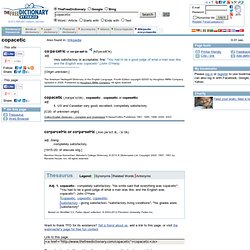
Updated in 2009. Published by Houghton Mifflin Company. All rights reserved. The Baader-Meinhof Phenomenon. You may have heard about Baader-Meinhof Phenomenon before.
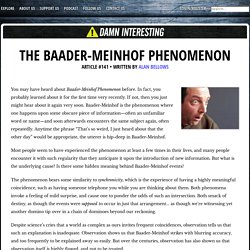
In fact, you probably learned about it for the first time very recently. If not, then you just might hear about it again very soon. Baader-Meinhof is the phenomenon where one happens upon some obscure piece of information—often an unfamiliar word or name—and soon afterwards encounters the same subject again, often repeatedly. Anytime the phrase “That’s so weird, I just heard about that the other day” would be appropriate, the utterer is hip-deep in Baader-Meinhof. Most people seem to have experienced the phenomenon at least a few times in their lives, and many people encounter it with such regularity that they anticipate it upon the introduction of new information.
The phenomenon bears some similarity to synchronicity, which is the experience of having a highly meaningful coincidence, such as having someone telephone you while you are thinking about them. The reason for this is our brains’ prejudice towards patterns. Mondegreen. Careful, writers! 10 common words with opposite meanings. The English language is full of words with uncommon properties.

There are backronyms, metaplasms, and neologisms. My favorite words of unusual properties are contranyms, or words that are spelled the same, but have two opposite meanings. These words are also known as Janus words, named after the Roman god of gates and doorways and of beginnings and endings. Janus words teach us the importance of context and bring a whole new meaning to the phrase “use it in a sentence.” Here are a few examples: Oversight. Cleave. Anthimeria. In rhetoric, anthimeria, traditionally and more properly called antimeria (from the Greek: ἀντί, antí, "against, opposite" and μέρος, méros, "part"), is any novel change in a word's use, most commonly the use of a noun as if it were a verb.[1][2] Modern Examples[edit] There are a number of examples throughout the English language that demonstrate the evolution of specific words from one lexical category to another.
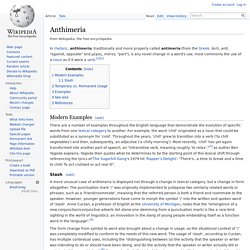
For example, the word 'chill' originated as a noun that could be substituted as a synonym for 'cold'. Bookshelf Porn. Eschar. The American Heritage® Dictionary of the English Language, Fourth Edition copyright ©2000 by Houghton Mifflin Company.

Updated in 2009. Published by Houghton Mifflin Company . All rights reserved. Semantic satiation. History and research[edit] The phrase "semantic satiation" was coined by Leon Jakobovits James in his doctoral dissertation at McGill University, Montreal, Canada awarded in 1962.[1] Prior to that, the expression "verbal satiation" had been used along with terms that express the idea of mental fatigue.
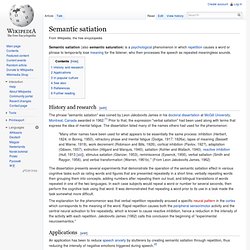
The dissertation listed many of the names others had used for the phenomenon: Ephebophilia. Mindfulness. English[edit] Etymology[edit] mindful + -ness.
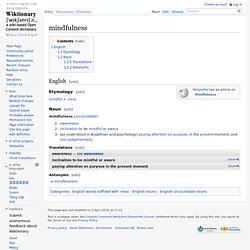
Sortilege. English[edit] Etymology[edit] From Old French sortilège, from mediæval Latin sortilegium, from Latin sortilegus (“sorcerer, diviner”), from sors (“sort”) + legere (“choose”) Pronunciation[edit] IPA(key): /ˈsɔːtɪlɪd͡ʒ/

Limerence. English[edit] Alternative forms[edit] limerance Etymology[edit] Coined by Dorothy Tennov, Professor of Psychology (Emeritus), University of Bridgeport, Connecticut, Circa 1977. The coinages are arbitrary; there is no specific etymology. Elision. Resistentialism. Fungible. Bokeh. English[edit] Example of bokeh. Etymology[edit] From Japanese 暈け (boke, “blur”), the nominalized form of the verb 暈ける (bokeru, “to blur (intransitive)”). The terminal -h (by comparison with the romanization boke) is a pronunciation guide, so that it is not pronounced as IPA(key): /boʊk/ as it would under standard English orthography. Contrast karate, karaoke, which have undergone sound change. Used since at least 1996,[1] with spelling bokeh popularized by editor Mike Johnston in the March/April 1997 issue of Photo Techniques magazine, which featured three commissioned articles on the topic, Johnston writing: “it is properly pronounced with bo as in bone and ke as in Kenneth, with equal stress on either syllable”.[2]
Philtrum. Librocubicularist. English[edit] L'esprit de l'escalier.